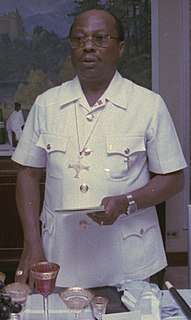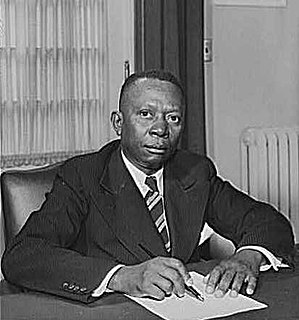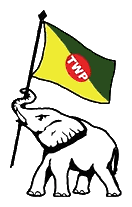
Samuel Kanyon Doe was a Liberian politician who served as the Liberian leader from 1980 to 1990, first as a military leader and later as a politician. Then Master Sergeant Doe served as chairman of the People's Redemption Council and de facto head of state after staging a violent coup d'etat in 1980; he killed President William R. Tolbert, Jr., and executed much of the True Whig Party leadership. Samuel Doe in turn was murdered by his conqueror, Prince Johnson, one time ally of Charles Taylor, in an internationally televised display.
Prince Yormie Johnson is a Liberian politician and the current Senior Senator from Nimba County. A former rebel leader, Johnson played a prominent role in the First Liberian Civil War, in particular capturing, torturing, mutilating and executing President Samuel Doe, who had himself overthrown and murdered the previous president William R. Tolbert Jr.

The President of the Republic of Liberia is the head of state and government of Liberia. The president serves as the leader of the executive branch and as commander-in-chief of the Armed Forces of Liberia.

William Richard Tolbert Jr. was the 20th President of Liberia from 1971 until 1980, when he was killed in a coup d'état led by Samuel Doe.

William Vacanarat Shadrach Tubman was a Liberian politician. He was the 19th President of Liberia, serving from his election in 1944 until his death in 1971.

The True Whig Party (TWP), also known as the Liberian Whig Party (LWP), is the oldest political party in Liberia. Founded in 1869 by primarily Americo-Liberians, the party dominated Liberian politics from 1878 until 1980. The nation was virtually a one-party state, although opposition parties were never outlawed. Initially, its ideology was strongly influenced by that of the United States Whig Party.
The People's Redemption Council (PRC) was a governmental body that ruled Liberia during the early 1980s. It was established after the 1980 Liberian coup d'état wherein Samuel Doe seized power on 12 April 1980. The Council, with Doe as its chairman, promised a complete overhaul of Liberia's society, economy, and political system and the replacement of the corruption of previous regimes with respect for the rights of the Liberian people. The PRC had 17 founding members and was later expanded to 28. The PRC initially functioned as the executive and legislative body in Doe's government. However, over time Doe consolidated power as a central executive. In 1984, the PRC was dissolved and replaced by the Interim National Assembly.

General elections were held in Liberia on 15 October 1985. These were the first elections since the 12 April 1980 military coup that brought Samuel Doe to power. During 1984, a new draft Constitutional referendum was approved, which allowed a 58 member civilian and military combined Interim National Assembly, headed by President Samuel Doe. The ban on political parties were lifted and four parties, namely, the President's National Democratic Party of Liberia, Liberian Action Party, Unity Party and Liberia Unification Party were in fray.

Ellen Johnson Sirleaf is a Liberian politician who served as the 24th President of Liberia from 2006 to 2018. Sirleaf was the first elected female head of state in Africa.
Togba-Nah Tipoteh is an economist, educator and politician, having been a presidential candidate in three elections. For more than three decades, he has been actively involved with democratic activities in promotion of human rights, liberties, constitutional rule and growth with development in Liberia and throughout Africa. He is President of the Movement for Justice in Africa (MOJA); was founding Chairman of the Collaborating Political Parties (CPP), an alliance of Liberian political parties; was founder and Director-General of Susukuu Incorporated, Liberia's oldest non-governmental development organization, which was credited by the West Africa Peacekeeping Force (ECOMOG) as helping to disarm over 10,000 combatants and child soldiers in Liberia during the 1997 disarmament program through a school for gun program; and was former Chairman of the Interest Groups of Liberia, a consortium of 32 national organizations with a collective membership of well over one million persons. He has worked in international development in the United States, the Netherlands, Mozambique, Ghana, South Africa and other countries, as well as for the United Nations system: Food and Agriculture Organization (FAO), United Nations Conference on Trade and Development (UNCTAD), International Monetary Fund (IMF), African Economic Community (ECA) and the International Bank for Reconstruction and Development (IBRD), among others.
Wilton Gbakolo Sengbe Sankawulo, Sr. was a Liberian politician and author.
William Vacanarat Shadrach Tubman Jr. is a Liberian politician and member of the Reformed United Liberia Party (RULP). He is the son of William Tubman, who was President of Liberia from 1943 to 1971, and the son-in-law of his father's successor, William R. Tolbert Jr., whose daughter Wokie he married.
The University of Liberia is a publicly funded institution of higher learning located in Monrovia, Liberia. Authorized by the national government in 1851, the school opened in 1863 as Liberia College and became a university in 1951. The school is one of the oldest institutions of higher learning in West Africa and is accredited by the Liberian Commission on Higher Education. Civil wars have disrupted and damaged the school over the last three decades.

The Constitution of Liberia is the supreme law of the Republic of Liberia. The current constitution, which came into force on 6 January 1986, replaced the Liberian Constitution of 1847, which had been in force since the independence of Liberia. Much like the 1847 Constitution, the Constitution creates a system of government heavily modeled on the Federal Government of the United States.

General elections were held in Liberia on 1 May 1951, the first to be held under universal suffrage, as previously only male descendants of Americo-Liberians had been allowed to vote. This was the first elections in Liberia where women and the local Liberians owning property were allowed to vote based on a Constitutional Referendum in 1945–46. In the presidential election, William Tubman of the True Whig Party was the only candidate, and was re-elected unopposed.

General elections were held in Liberia on 7 October 1975, alongside a simultaneous referendum on presidential term limits. In the presidential election, incumbent William Tolbert of the True Whig Party was the only candidate, and was re-elected unopposed. In the legislative elections True Whig Party candidates won all 71 seats in the House of Representatives and all 18 seats in the Senate unopposed. Voter turnout was around 80%.
Frank Emmanuel Tolbert was a Liberian politician and brother of President William R. Tolbert, Jr. The oldest son of William R. Tolbert Sr., national chairman of the ruling True Whig Party, he grew up in Bensonville, attended Zion Praise Baptist Church, graduated from Liberia College, and became involved in politics relatively early in life. As his family became more and more closely connected to the family of Supreme Court Justice William V.S. Tubman, Frank began to become prominent: when Tubman ran for President in 1943, he was rumoured to be Tubman's first choice for Vice President, although his younger brother William was eventually chosen, perhaps because of Frank's unpredictable moods and violent temper.

A constitutional referendum was held in Liberia on 4 April 1972. The changes to the constitution would lower the voting age from 21 to 18, and had been announced by President William R. Tolbert, Jr. shortly after taking office. On 15 February the date of the referendum was set to coincide with a by-election for the Vice Presidency. The change required a two-thirds majority in favour, and was approved by voters.

The 1980 Liberian coup d'état happened on April 12, 1980, when President William Tolbert was overthrown and murdered in a violent coup. The coup was staged by an indigenous Liberian faction of the Armed Forces of Liberia (AFL) under the command of Master Sergeant Samuel Doe. Following a period of transition Doe would go on to rule the country throughout the 1980s until his murder on 9 September 1990 during the First Liberian Civil War.

Edison Reginald “Reggie” Townsend was a Liberian journalist and statesman known for the establishment of Liberia’s Information Services. He served as Secretary of Information and Cultural Affairs under President William V. S. Tubman, and as Minister of State for Presidential Affairs under President William R. Tolbert. In 1979 he was elected National Chairman of the True Whig Party. Following the 1980 Liberian coup d'état of President Tolbert on April 12, 1980, he and several other members of the Tolbert administration were put on trial and without due process executed by firing squad on April 22, 1980.










